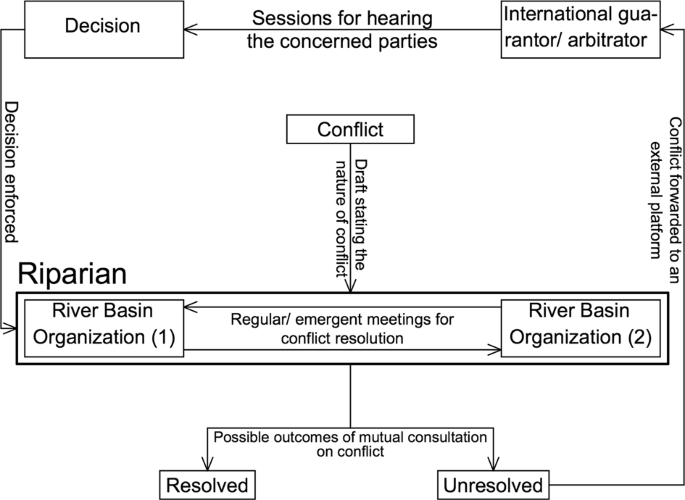
Rivera, A. Transboundary aquifers along the Canada–USA border: science, policy and social issues. J. Hydrol. Reg. Stud. 4, 623–643 (2015).
UNESCO. Sharing Water, Sharing Benefits: Working Towards Effective Transboundary Water Resources Management. A Graduate/Professional Skills-Building Workbook (ed. Wolf, A.T.) 284 (UNESCO, Oregon State University, 2010).
Wolf, A., Yoffe, S. & Giordano, M. International waters: identifying basins at risk. Water Policy 5, 31–62 (2003).
Yoffe, S., Wolf, A. T. & Giordano, M. Conflict and cooperation over international freshwater resources: indicators of basins at risk. J. Am. Water Resour. Assoc. 39, 1109–1126 (2003).
Barnaby, W. Do nations go to war over water? Nature 458, 282–283 (2009).
Brochmann, M. Signing river treaties—does it improve river cooperation. Int. Interact. 38, 141 (2012).
Dai, A. G., Qian, T. T., Trenberth, K. E. & Milliman, J. D. Changes in continental freshwater discharge from 1948 to 2004. J. Clim. 22, 2773–2792 (2009).
Cosens, B. The Columbia River Treaty: an opportunity for modernization of basin governance. Colorado Nat. Res. Energy Environ. Law Rev. 27, 1–19 (2016).
IPCC (Intergovernmental Panel on Climate Change). IPCC Fourth Assessment Report: Climate Change 2007. Synthesis report summary for policy makers (IPCC, Geneva, 2007).
De Stefano, L., Duncan, J., Dinar, S., Stahl, K., Strzepek, K. & Wolf, A. T. Mapping the Resilience of International River Basins to Future Climate Change-Induced Water Variability. Water Sector Board Discussion Paper No. 15, The World Bank, Washington, DC (2010).
Brochmann, M. & Hensel, P. R. Peaceful management of international river claims. Int. Negotiation 14, 393–418 (2009).
Qiu, J. Indus river waters shrinking. Nature 534, 600–601 (2016).
Briscoe, J. & Qamar, U. Pakistan’s Water Economy Running Dry (Oxford University Press, Karachi, 2007) (Commissioned by World Bank).
Slater, J. India wants to use water as a weapon against Pakistan. A 59-year-old treaty stands in the way. The Washington Post (2019). https://www.washingtonpost.com/world/2019/02/22/indias-threats-pakistan-offer-hint-future-water-wars/?noredirect=on&utm_term=.efbaa96c5d95. Accessed 4 Mar. 2019.
Gettleman, J. India Threatens a New Weapon Against Pakistan: Water. The New York Times (2019). https://www.nytimes.com/2019/02/21/world/asia/india-pakistan-water-kashmir.html. Accessed 6 Mar. 2019.
Hart, G., Rudman, W. et al. U.S. Commission on National Security in the 21st Century [Hart-Rudman Commission], Supporting Research and Analysis, The Phase I Report on the Emerging Global Security Environment for the First Quarter of the 21st Century, New World Coming: America Security in the 21st Century (15 September 1999), 16; The White House, A National Security Strategy for a New Century (December 1999), 13.
Wilner, A. Freshwater scarcity and hydropolitical conflict: between the science of freshwater and the politics of conflict. J. Military Strategic Stud. 8, 11–19 (2005).
Kraska, J. Sharing water, preventing war—hydrodiplomacy in South Asia. Dipl. Statecraft 20, 515–530 (2009).
Tarlock, A. D. The International Joint Commission and Great Lakes Diversions: indirectly extending the reach of the boundary waters treaty. Wayne L. Rev. 54, 1661 (2008).
Nax, N.A. Looking to the Future: The Indus Water Treaty and Climate Change, Conflict and Dispute Resolution Program (Graduate School of University of Oregan, Oregan, 2016).
Gleick, P. H. How much water is there and whose is it? In: The World’s Water 2000–2001: The Biennial Report on Freshwater Resources (Island Press, Washington, DC, 2000).
Shamir, U. Water agreements between Israel and its neighbors. In: Transformations of Middle Eastern Natural Environments: Legacies and Lessons (eds Albert, J., Bernhardson, M. & Kenna, R.) Bulletin Series, Number 103, 274–296 (Yale School of Forestry and Environmental Studies, 1998).
Garretson, A. The Nile river system. In: Proc. American Society of International Law at Its Annual Meeting, Vol. 54, 136–144 (1960). https://doi.org/10.1017/S0272503700038672.
Gerlak, A. & Schmeier, S. in Oxford Handbook on Water Politics and Policy (eds. Conca, K. & Weinthal, E.) (Oxford University Press, Oxford, 2016)
The World Bank. Indus Water Treaty. World Affairs, 123, 99–101 (1960). http://www.jstor.org/stable/20669916
Boundary Treaty between Canada and the United States. Am. J. Int. Law 19(4), 122–128 (1925). https://doi.org/10.2307/2213187. (Supplement: Official Documents).
Elmusa, S. The Jordan-Israel water agreement: a model or an exception? J. Palest. Stud. 24, 63–73 (1995).
Abdalla, I. H. The 1959 Nile Waters Agreement in Sudanese-Egyptian relations. Middle Eastern Studies. 7, 329–341 (1971).
Morris, M. & De Loë, R. Cooperative and adaptive transboundary water governance in Canada’s Mackenzie River Basin: status and prospects. Ecol. Soc. 21(1), 26 (2016).
Barchiesi, S., Welling, R., Dalton, J. & Smith, M. in Transboundary Water Governance: Adaptation to Climate Change (eds Sanchez, J. C. & Roberts, J.) (International Union for Conservation of Nature & IUCN Environmental Law Centre, Gland, Switzerland, 2014).
Gleick et al. The World’s Water. Volume 7: The Biennial Report on Freshwater Resources (Island Press, Washigton, DC, 2011).
Hamner, J. & Wolf, A. patterns in international water resource treaties: the transboundary freshwater dispute database. Colorado J. Int. Env. Law Policy (1998).
UNEP/OSU (United Nations Environment Programme and Oregon State University). Atlas of International Freshwater Agreements (UNEP Press, Nairobi, Kenya, 2002).
Fischhendler, I. Legal and institutional adaptation to climate uncertainty: a study of international rivers. Water Policy 6, 281–302 (2004).
Klare, M., Smith, M. & Turton, A. The big question: will global conflict flow from the quest for water security? World Policy J. 26, 5–8 (2009).
Mitchell, S. M. & Zawahri, N. A. The effectiveness of treaty design in addressing water disputes. J. Peace Res. 52, 187–200 (2015).
Bagla, P. Along the Indus River, saber rattling over water security. Science 328, 1226–1227 (2010).
World Bank. Mediation essentials (English). Mediation series (World Bank Group, Washington, DC, 2017). http://documents.worldbank.org/curated/en/153761503566770915/Mediation-essentials.
Schmeier, S. The institutional design of river basin organizations—empirical findings from around the world. Int. J. River Basin Manag. 13, 51–72 (2014).
UNECE. Convention on the Protection and Use of Transboundary Watercourses and International Lakes. UN Doc E/ECE/1267, New York, 17 March 1992.
Akhtar, S. Emerging challenges to indus water treaty: issues of compliance and trans boundary impacts of Indian hydro projects on the western rivers. J. Ins. Reg. Stud. 28, 311–316 (2010).
“Pakistan accuses India of “stealing” water.” Telegraph, 26 March 2009. http://www.telegraph.co.uk/news/worldnews/asia/pakistan/5052150/Pakistan-accuses-India-ofstealing-water.html.
Uitto, J. I. & Duda, A. M. Management of transboundary water resources: lessons from international cooperation for conflict prevention. Geogr. J. 168, 365–378 (2003).
Afed, U. K., Jiang, J., Wang, P. & Zheng, Y. Influence of watershed topographic and socio-economic attributes on the climate sensitivity of global river water quality. Environ. Res. Lett. 12, 104012 (2017).
Parkes, L. The politics of ‘water scarcity’ in the Nile basin: The case of Egypt. J. Politics Int. Stud. 9, 433–480 (2013).
Cascão, A. E. Changing power relations in the Nile river basin: unilateralism vs. cooperation. Water Alternatives 2, 245–268 (2009).
Climate talks are not enough. Nature 556, 407–408. https://doi.org/10.1038/d41586-018-04925-4 (2018).
Thu, H. N. & Wehn, U. Data sharing in international transboundary contexts: the Vietnamese perspective on data sharing in the Lower Mekong Basin. J. Hydrol. 536, 351–364. https://doi.org/10.1016/j.jhydrol.2016.02.035 (2016).
Lee, T. M., Markowitz, E. M., Howe, P. D., Ko, C.-Y. & Leiserowitz, A. A 2015 predictors of public climate change awareness and risk perception around the world. Nat. Clim. Change 5, 1014–20 (2015).
AQUASTAT (UN Food and Agriculture Organisation Information System on Water and Agriculture). Indus Basin Water Report 37 (2011). http://www.fao.org/nr/water/aquastat/basins/indus/index.stm.
Webersik, C. Climate Change and Security: A Gathering Storm of Global Challenges 44 (Praeger, Santa Barbara, CA, USA, 2010).
Adeel, Z., & Wirsing, R. G. (eds). Imagining Industan: Overcoming Water Insecurity in the Indus Basin (Dordrecht, 2017).
FAO. Irrigation in Southern and Eastern Asia in Figures: AQUASTAT Survey 2011. 129–140. (Food and Agriculture Organisation, Rome, Italy, 2012).
Laghari, A. N., Vanham, D. & Rauch, W. The Indus basin in the framework of current and future water resources management. J. Hydrol. Earth Sysems Sci. 16, 1063–1083 (2012).
Eigenbrod, F. et al. The impact of projected increases in urbanization on ecosystem services. Proc. Biol. Sci. 278, 3201–3208 (2011).
Immerzeel, W. W., van Beek, L. P. H. & Bierkens, M. F. P. Climate change will affect the Asian water towers. Science 328, 1382–1385 (2010).
Robins, T. E. Defusing hydroelectric Brinkmanship: The Indus Waters Treaty’s alternate dispute resolution provisions and their role in the tenuous peace between India and Pakistan. Yearbook Arbitration Mediation 5, 389–408 (2013).
Fazil, M.D. Why India must refrain from a water war with Pakistan: threatening Pakistan’s water supply will have a negative impact on India and all of South Asia. The Diplomat (2017). https://thediplomat.com/2017/03/why-india-must-refrain-from-a-water-war-with-pakistan/.
Timmerman, J. G., Matthews, J., Koeppel, S., Valensuela, D. & Vlaanderen, N. Improving governance in transboundary cooperation in water and climate change adaptation. Water policy 19, 1014–1029 (2017). http://wp.iwaponline.com/content/early/2017/07/17/wp.2017.156.
Karger, D. N. et al. Climatologies at high resolution for the earth’s land surface areas. Scientific Data 4, 170122 (2017). https://doi.org/10.1038/sdata.2017.122.
Boucher, O., Bellassen, V., Benveniste, H., Ciais, P., Criqui, P., Guivarch, C., Le Treut, H., Mathy, S. & Séférian, R. Opinion: in the wake of Paris Agreement, scientists must embrace new directions for climate change research. Proc. Natl. Acad. Sci. USA 113, 7287–7290 (2016).
Stewart, I. T., Cayan, D. & Dettinger, M. Changes in snowmelt runoff timing in western North America on a “business as usual” climate change scenario. Clim. Change 62, 217–232 (2004).
Stewart, I. T., Cayan, D. & Dettinger, M. Changes toward earlier streamflow timing across western North America. J. Clim. 18, 1136–1155 (2005).
Arrigoni, A. S., Greenwood, M. C. & Moore, J. N. Relative impact of anthropogenic modifications versus climate change on the natural flow regimes of rivers in the Northern Rocky Mountains, United States. Water Resour. Res. 46, W12542 (2010).
Global Water Partnership. The 2010 GWP Consulting Partners (CP) Meeting with the theme: Exploring the Role of Water Security in Regional Economic Development. Presentation by Technical Committee Chair, Mohamed Ait Kadi, at the CP meeting held in Stockholm, Sweden, 3–4 (2010).
Boussalis, C. & Coan, T. G. Text-mining the signals of climate change doubt. Glob. Environ. Change 36, 89–100 (2016).
Dasgupta, N. & Miglani, S. Troubled waters? India fast-tracks hydro projects in disputed Kashmir. Reuters (16 Mar. 2017). https://in.reuters.com/article/indiapakistan-water/troubled-waters-india-fast-tracks-hydro-projects-in-disputed-kashmir-idINKBN16N0XE.
Babel, M. S. & Wahid, M. Freshwater Under Threat South Asia: Vulnerability Assessment of Freshwater Resources to Environmental Change. (United Nations Environment Programme (UNEP), Nairobi, 2008).
Laghari, A. N., Vanham, D. & Rauch, W. The Indus basin in the framework of current and future water resources management. Hydrol. Earth Syst. Sci. 16, 1063–1083 (2012). https://doi.org/10.5194/hess-16-1063-2012.
Certain Expenses of the United Nations. Advisory Opinion. I.C.J. Rep. 151 (1962).
Walsh, B. et al. Pathways for balancing CO2 emissions and sinks. Nat. Commun. 8, 14856 (2017).
Source: Resources - nature.com



